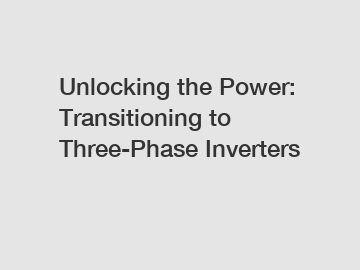Unlocking the Power: Transitioning to Three-Phase Inverters
Unlocking the Power: Transitioning to Three-Phase Inverters.
In the world of electrical engineering and renewable energy solutions, advancements are constantly being made to harness more efficient and sustainable power sources. One such innovation that is gaining popularity is transitioning from single-phase to three-phase inverters. This shift holds tremendous potential to elevate power generation and distribution systems to new heights. In this blog, we will delve into the reasons behind this transition, the benefits it offers, and the exciting possibilities it unlocks.
Before we delve into the advantages of three-phase inverters, it's essential to understand the fundamental difference between single-phase and three-phase power. Single-phase power is commonly used in residential applications where the load demand is relatively low. However, when it comes to commercial and industrial settings, the high power demand necessitates the adoption of three-phase power systems. Three-phase power allows for a higher power output and more balanced distribution, making it ideal for heavy-duty applications.

Now that we've established the foundation, let's explore the reasons why transitioning to three-phase inverters is a game-changer. The first key advantage is increased power output. Three-phase inverters have a higher power-handling capacity, allowing for more electricity to be generated and distributed efficiently. This is particularly beneficial for large-scale industrial projects where a robust power supply is of utmost importance.
Furthermore, three-phase inverters offer superior voltage regulation. By distributing power through three separate conductors instead of one, voltage imbalances are greatly reduced. This ensures a more stable and reliable power supply, minimizing the risk of voltage fluctuations that can harm sensitive equipment and machinery. The improved voltage regulation also translates to better power quality, resulting in smoother operation of electrical devices and reduced energy waste.
Another significant advantage is improved efficiency. When compared to single-phase inverters, three-phase systems provide a more efficient conversion of DC to AC power. This increased efficiency reduces power losses, which in turn leads to lower operational costs and a smaller environmental footprint. The energy savings achieved by three-phase inverters make them an attractive option for businesses aiming to reduce their carbon footprint and optimize their energy consumption.
Furthermore, three-phase inverters facilitate power sharing and load balancing. In a three-phase system, power can be divided equally across multiple phases, ensuring each phase carries an almost balanced load. This not only enhances the stability of the electrical grid but also allows for more effective use of resources. By evenly distributing the load, the stress on individual components is reduced, extending the system's overall lifespan and reducing maintenance requirements.
Moreover, transitioning to three-phase inverters unlocks a world of possibilities for renewable energy integration. As the global demand for clean energy continues to escalate, the need for efficient integration of renewable sources, such as solar and wind, becomes imperative. Three-phase inverters enable seamless integration of these intermittent energy sources into the grid, ensuring a smooth transition towards a more sustainable future.
In addition to the technical advantages, three-phase inverters also offer economic benefits. The increased power output and efficiency provided by three-phase systems result in higher productivity, reduced downtime, and enhanced equipment performance. These factors contribute to improved profitability and a more competitive edge for businesses operating in industries reliant on electrical power.
As the world continues to grapple with the challenges posed by climate change and the need for sustainable practices, transitioning to three-phase inverters represents a significant leap forward. The adoption of three-phase systems stands to revolutionize power generation and distribution, bringing forth numerous benefits for businesses, industry, and society at large.
In conclusion, the power of transitioning to three-phase inverters cannot be overstated. With increased power output, improved voltage regulation, enhanced efficiency, greater load balancing capabilities, and expanded possibilities for renewable energy integration, three-phase inverters set a new benchmark for electrical power systems. By embracing this transition, businesses and economies can unlock tremendous potential and contribute to a greener, more sustainable future.
If you want to learn more, please visit our website solar three phase inverter, three phase inverters, commercial power inverter.


